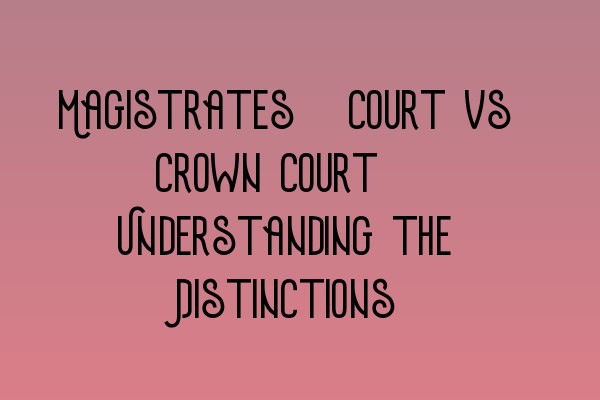Magistrates’ Court vs Crown Court: Understanding the Distinctions
Welcome to the SQE Criminal Law & Practice Law UK blog! In today’s post, we will explore the distinctions between Magistrates’ Court and Crown Court. Understanding these differences is crucial for aspiring legal professionals preparing for the SQE exams. If you’re interested in practicing criminal law and want to succeed in your career, this article is a must-read. Let’s dive in!
The Role of Magistrates’ Court
Magistrates’ Court is the lower court in the criminal justice system in England and Wales. It handles less serious criminal cases, such as minor offenses and preliminary hearings. This court is presided over by a panel of three magistrates or a single district judge.
In the SQE 1 Practice Exam Questions, you will come across various scenarios that require knowledge of Magistrates’ Court procedures. It’s essential to familiarize yourself with the rules and processes to answer these questions correctly.
The jurisdiction of Magistrates’ Court covers a wide range of offenses, including theft, public order offenses, traffic offenses, and more. The court primarily focuses on summary offenses, which are less serious crimes that carry lower penalties. However, it can also handle either-way offenses, which may be more serious and can be sent to the Crown Court for trial.
If you’re preparing for the SQE 1 exams, make sure to practice with SQE 1 Practice Mocks FLK1 FLK2 to enhance your understanding of the differences between Magistrates’ Court and Crown Court.
The Role of Crown Court
Crown Court is the higher court in the criminal justice system in England and Wales. It deals with serious criminal cases, including indictable offenses and either-way offenses sent for trial from Magistrates’ Court. The cases in Crown Court are heard by a judge and a jury.
In SQE 2, your knowledge of Crown Court procedures and practices will be put to the test. Through comprehensive SQE 2 Preparation Courses, you can gain the necessary skills and competency required to navigate the complexities of this court effectively.
Unlike Magistrates’ Court, Crown Court has the power to impose more severe sentences, including imprisonment, longer custodial sentences, and hefty fines. It handles complex cases that require detailed examination of evidence and legal arguments.
If you’re interested in pursuing a career in criminal law and representing clients in the Crown Court, it’s essential to develop a strong understanding of the court’s procedures, rules of evidence, and advocacy skills. Enrolling in SQE 1 Preparation Courses will provide you with the necessary knowledge and practical guidance to excel in this field.
Conclusion
Understanding the distinctions between Magistrates’ Court and Crown Court is vital for aspiring criminal law practitioners. Familiarizing yourself with the rules, procedures, and role of each court is crucial for success in the SQE exams and your future career.
If you’re preparing for the SQE exams, ensure you are aware of the SRA SQE Exam Dates to plan your study schedule effectively and maximize your chances of success.
We hope this article has provided you with valuable insights into Magistrates’ Court and Crown Court. Keep studying, practicing, and honing your skills to become an exceptional criminal law professional!
